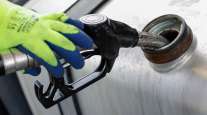Senior Reporter
Study Finds Continued Savings for 17 Fleets Through Use of Fuel-Efficient Technologies
This story appears in the Aug. 29 print edition of Transport Topics.
Seventeen trucking fleets realized a 3% increase in fuel savings in 2015, equally about a half-billion dollars, compared with the national average by adopting fuel-efficient technologies, according to a new report from the North American Council for Freight Efficiency.

The fleets, with a combined 62,000 tractors and 217,000 trailers, indicated they adopted technologies such as electronically controlled transmissions, anti-idle electronic engine controls, aeronamic hoods and fenders, aerodynamic bumpers and aerodynamic mirrors.
According to the analysis, several fleets also relied on auxiliary power units and engine parameters set for fuel economy.
“It does cost money to get this fuel economy so, they do spend on the technology, it’s just a matter of level,” said Mike Roeth, NACFE’s executive director and operation lead for Carbon War Room’s Trucking Efficiency.
Carbon War Room, a nonprofit founded by Richard Branson, promotes sustainable energy in the transportation sector.
“Investing in efficiency technologies is the new normal. And these fleets are continuing to make investments because they do not want to be caught short when fuel prices go up again,” Roeth said.
The report stressed that the cost of fuel must be taken into account when doing return-on-investment calculations for investments in fuel-efficiency technologies.
“Yes, lower diesel prices make the paybacks for some technologies longer, but the price of diesel isn’t the only reason fleets should strive to improve their fuel economy. Whether fuel is $4 a gallon or $2 a gallon, when you improve fuel economy you cut expenses from the bottom line,” the report said.
The report also noted a new federal regulation on greenhouse-gas emissions will help fleets achieve greater fuel efficiency in the long term. Additionally, with more trucks on the roads over the next few years, efficiency technology makers need to enhance their products’ efficiency to meet a company’s’ demands.
Ryder System Inc., one of the participating fleets, adopted several newer technologies, such as anti-idle electronic engine controls, and its in-house experts said fuel efficiency increased significantly.
Other fleets in the study, such as UPS Inc. and XPO Logistics, also realized significant improvements in fuel economy with newer equipment such as aerodynamic bumpers, according to the report.




